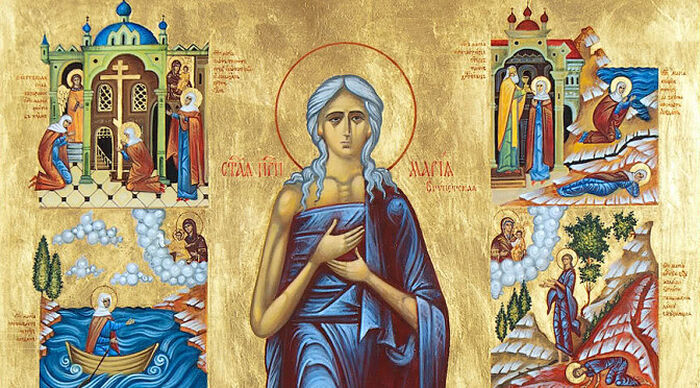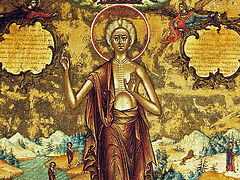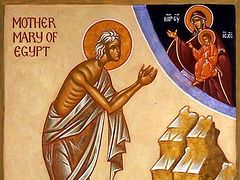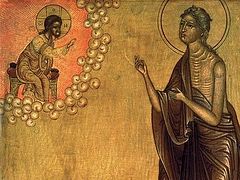This kind goeth not out but by prayer and fasting (Mt. 17:21). If you recall, last Sunday, the fourth week of Great Lent, the Gospels proclaimed to us, This kind goeth not out but by prayer and fasting. What is this kind?
If you recall, brothers and sisters, we were told of a youth who was possessed, and who was thrown now into the fire, now into water, as the father said who brought this youth to Christ. And Christ said, This kind goeth not out but by prayer and fasting. Here is what “kind”. The kind [of demon] that possessed this youth, that threw him [into fire and water]. The poor boy not only knew no peace, he knew no life. And Christ says, “is cast out”. That means that it is something separate. Is this understandable to us, or not? Brothers, if you only open a newspaper you will immediately understand what “this kind” is. Look at how many people, in a state of despair, throw themselves into the water to end their own lives—thinking that there is no eternal life. And into the fire… Here you’ll find so many who, again, from despair, throw themselves into the fire… They become human torches, lighting themselves on fire. It is the same thing: an affected state, or depression; or to the contrary, some kind of state that reaches the point of madness, human pride. And how many people fall into these terrible states of sexual excess, how many terrible states of robbery, or murder are connected with this terrible love of money, hunger for power. What is this? This is that very kind. We act as if we have nothing to do with this. Oh... if only we had nothing to do with it!
Now we are going through the period of life that we call spiritual spring. If the farmer is late with sowing, there will be no sprouting and no grain; and if a person is late in acquiring sobriety, attention to his inner man, to his heart, then he will be left without spiritual nourishment, in spiritual hunger. If there is some kind of passion in his heart, and he recognizes it, then he will likewise understand that no one can cast out this passion except the One Who created man. But for this he needs to prepare himself. And this preparation is fasting and prayer. These are the feelings with which we should have remained during this week. And if we were in this state in which every Christian should be, then we should especially have been so during this fifth week of Lent, when the Church cried out, “Before I perish utterly, save me O Lord!” when the Great Canon of Repentance of St. Andrew of Crete was read, which tore the heart and turned it inside out, and revealed to us this very state of the passions so that we might be able to draw near to the Lord and say, “Forgive me, O God; heal me, give me your eternal light, give me life. Maybe I have no more than a year left to live, maybe even less… Perhaps I am even now going to Thee.” We are all going there, to eternity, and the Church gives us this time for preparation, so that we would see ourselves and acquire strength; so that we would depart into eternal existence.
We were told in last week’s Gospel that this kind goes out by prayer and fasting. We think that fasting is when vegetable oil is on the table. Yes, of course, abstinence from foods is also fasting. But fasting consists not only in this, this is only part of fasting. Fasting is when a person opens his heart so that he sees everything unneeded in it and sweeps it away, taking only what is necessary, to preserve it in his heart. And prayer? Prayer… that is a state when the soul, feeling divine peace, ceaselessly calls out to the Lord: Help me, do not allow… Do not allow the murder in me of the most important feeling: my conscience. And at the end of this week—I don’t know about you, but I nevertheless feel a state of unworthiness.
And so this day is for me a great consolation. In what sense? Here before us, before our spiritual eyes stands St. Mary of Egypt. She was a sinful woman, who became the classic face, the classic image of a Christian woman. She was an outrageous courtesan of Alexandria, Egypt. She was a harlot. She was a “public” woman. She was a beauty. And her depravity knew no bounds. And suddenly she saw a crowd of people boarding a ship. Thus did she travel to Jerusalem. She went with that crowd, which was going to venerate the Cross of the Lord. Why not? The whole crowd went, and she went. But when the crowd was entering the narthex, no matter what Maria did, she couldn’t enter into the church. Everyone had already entered, but she was as if riveted to the spot. It was as if the wind or a wave pushed her away. No matter how she trembled, no matter how much she wanted to enter, she could not—whatever it was would not let her in. Finally, she understood that some terrible power was not letting her in. Then she looked, and saw standing before her a face, the icon of the Mother of God with the Divine Child. Immediately the veil that was obscuring her conscience open up. She had heard about Christ, and heard that Christ called people to chasteness.
And then her conscience revealed her entire sin to her, and she fell down before the Heavenly Queen, crying out, “Forgive me! Help me! Then, she herself did not understand what had happened. She suddenly, as if carried up by the wind, was brought into the church and fell down before the Cross of the Lord. Then a miracle happened to her: She suddenly had a thirst for purity, for chastity. She began to desire this lightness, a pure conscience. And when she felt forgiveness, she paid no attention to anyone, and without anything, ran to the Jordan River, walked across it and hid herself in that desert. Thus did she live for seventeen years in a state of sobriety, eating the dirt, as she said, in order to destroy those lusts, those fleshly desires, that destructive “kind” of bodily movement. Then, for seventeen years she lived in the praise of divine grace. She was like an angel. So, I say, that this day which the holy Church places before us is a consolation for us. There isn’t a sinner that the Lord would not forgive.
Brothers and sisters! After all, each one of us will undoubtedly be covered by a coffin lid. Each of us will be hidden in a grave. But our souls will pass to eternity. What will we meet there? Do we at least think about what will be there? The Church calls and calls us to repentance. But how do we begin? So, pay attention here: Mary was unable to enter the church, someone would not let her in. Take a look at yourselves, at your conscience. You have the same problem: Someone is not allowing you into total dedication to Christ. Cut it off. But how? This is how: just like Mary. Run to the Mother of God. This is what I’m asking you to do. This is the greatest joy. And run to the Lord. Say, Lord, help me to be a Christian. Help me, so that my systole and diastole would beat out only one feeling: dedication to the Lord, the fulfillment of His commandments. And then… then will come a clear, bright spring. And nearing the feast of Pascha, we will hear Christ’s words: Peace be unto you! And may this peace abide in us.
From: The One Thing Needful.
The blessings of the Lord be upon you…




